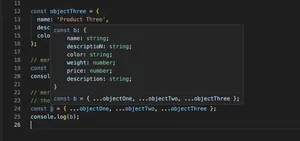Overview
TypeScript is a statically-typed superset of JavaScript, providing optional static typing, classes, and interface. One powerful feature of TypeScript is its type-checking capabilities, which can help developers detect errors early in the development process. However, managing types can become complex when dealing with delayed initialization and the implicit any type.
Understanding Delayed Initialization
In TypeScript, variables can be declared without instantiating them immediately. This practice is known as delayed initialization. While this may be useful in many scenarios, it can lead to issues where TypeScript’s type inference gets tricky.
let myVariable; // Delayed InitializationWithout an explicit type, the compiler cannot infer what type myVariable is supposed to be, which can lead to undesired behavior or errors.
Dealing with Implicit ‘Any’
When a variable is declared without a type, and TypeScript cannot infer the type from the context, it assigns an implicit ‘any’ type.
let myVariable; // Implicitly has an 'any' typeThis can potentially defeat the purpose of using TypeScript, as ‘any’ type variables do not provide the same level of type safety and tooling benefits.
Proper Initialization
The best practice is to initialize variables with a type or value ensuring TypeScript has enough information to infer the type appropriately.
let myVariable: string;
// Delayed initialization with a type declareor:
let myVariable = 'Hello, World!';
// Immediate initialization with a valueIn both cases, TypeScript can determine that myVariable is a string and can enforce type checks accordingly.
Working with Functions
When dealing with functions, it is especially important to properly type the return value, especially when the function includes a path that delays the return value’s initialization.
function delayedInitFunction(condition: boolean): string {
let result: string; // Correctly typed but not initialized
if (condition) {
result = 'Initialized';
}
return result; // Potential for 'undefined' to be returned
}The above pattern is error-prone since if the condition is false, result would be undefined, which is not a string. This goes against our declared return type.
Utilizing strictNullChecks
Enabling strictNullChecks in the TypeScript compiler options will enforce that all variables are either explicitly initialized or accounted for possible null or undefined values.
Advanced Techniques
In more advanced cases, delayed initialization may need to be used in coordination with complex types or class properties.
class MyClass {
private _property?: string; // Delayed initialization
constructor(private shouldInit: boolean) {
if (shouldInit) {
this._property = 'Initialized';
}
}
get property(): string {
if (typeof this._property === 'undefined'){
throw new Error('Property is not initialized.');
}
return this._property;
}
}In the above class, _property might be undefined if shouldInit is false, yet the getter property enforces that _property is always a string when accessed, thus bridging the gap between delayed initialization and type safety.
Type Alias and Interfaces
Another advanced tactic is to use type aliases or interfaces to ensure initialization is performed correctly across different parts of your application.
type Init = T | undefined;
function initialize(arg: Init): Type {
if (arg === undefined) throw new Error('Variable not initialized.');
return arg;
}This utility can be used to guarantee that a variable has been initialized before being used, thus preventing runtime errors.
Conclusion
Delayed initialization is a powerful feature in TypeScript, but if not managed correctly with strict typing, it can result in subtle bugs. By using the strategies outlined above, developers can ensure their code is robust, executing as expected, and fully benefiting from TypeScript’s type system. Judicious use of these techniques results in cleaner, safer, and more maintainable code.
